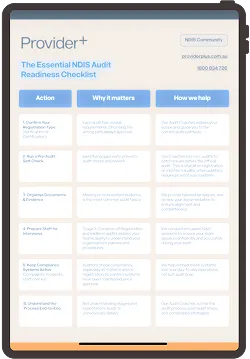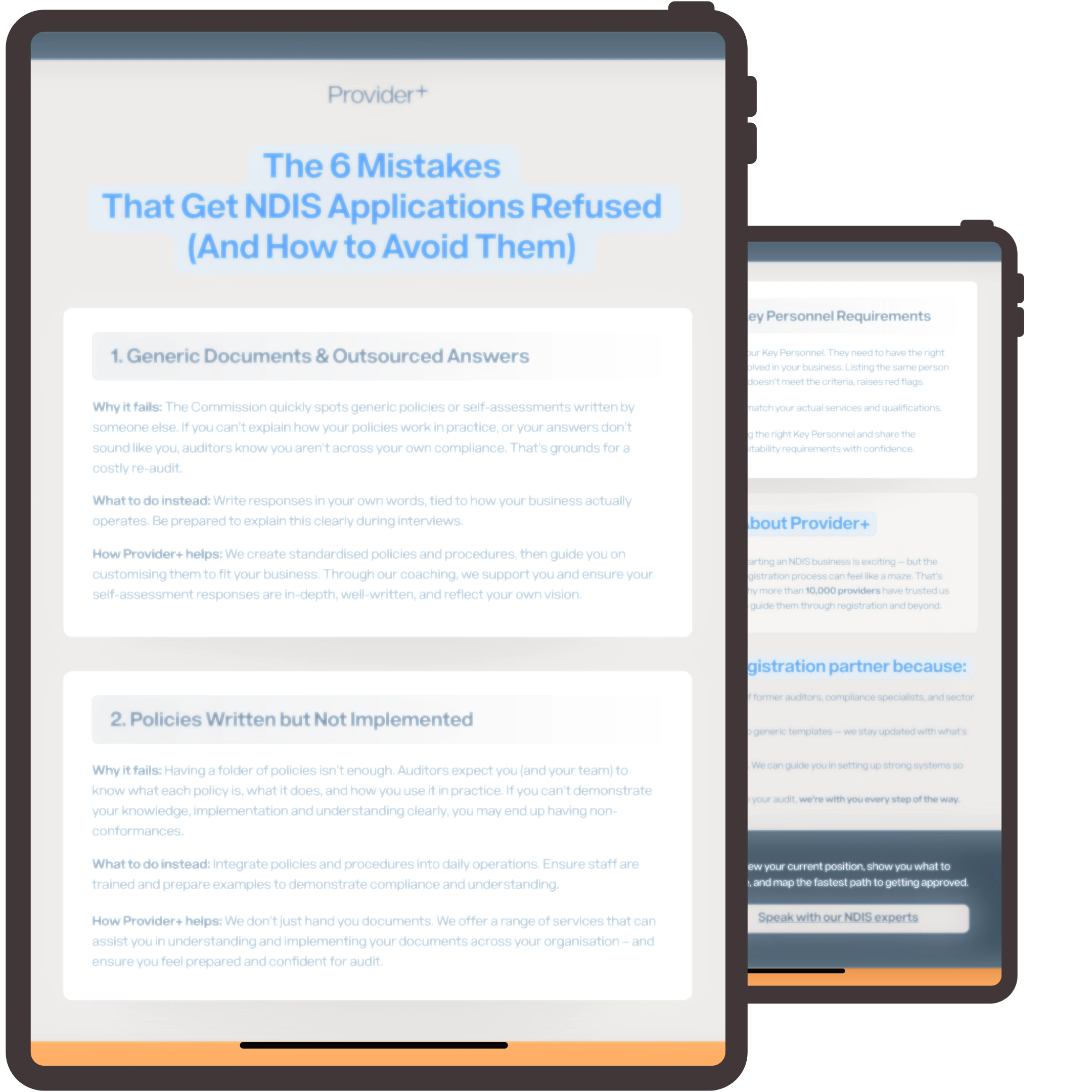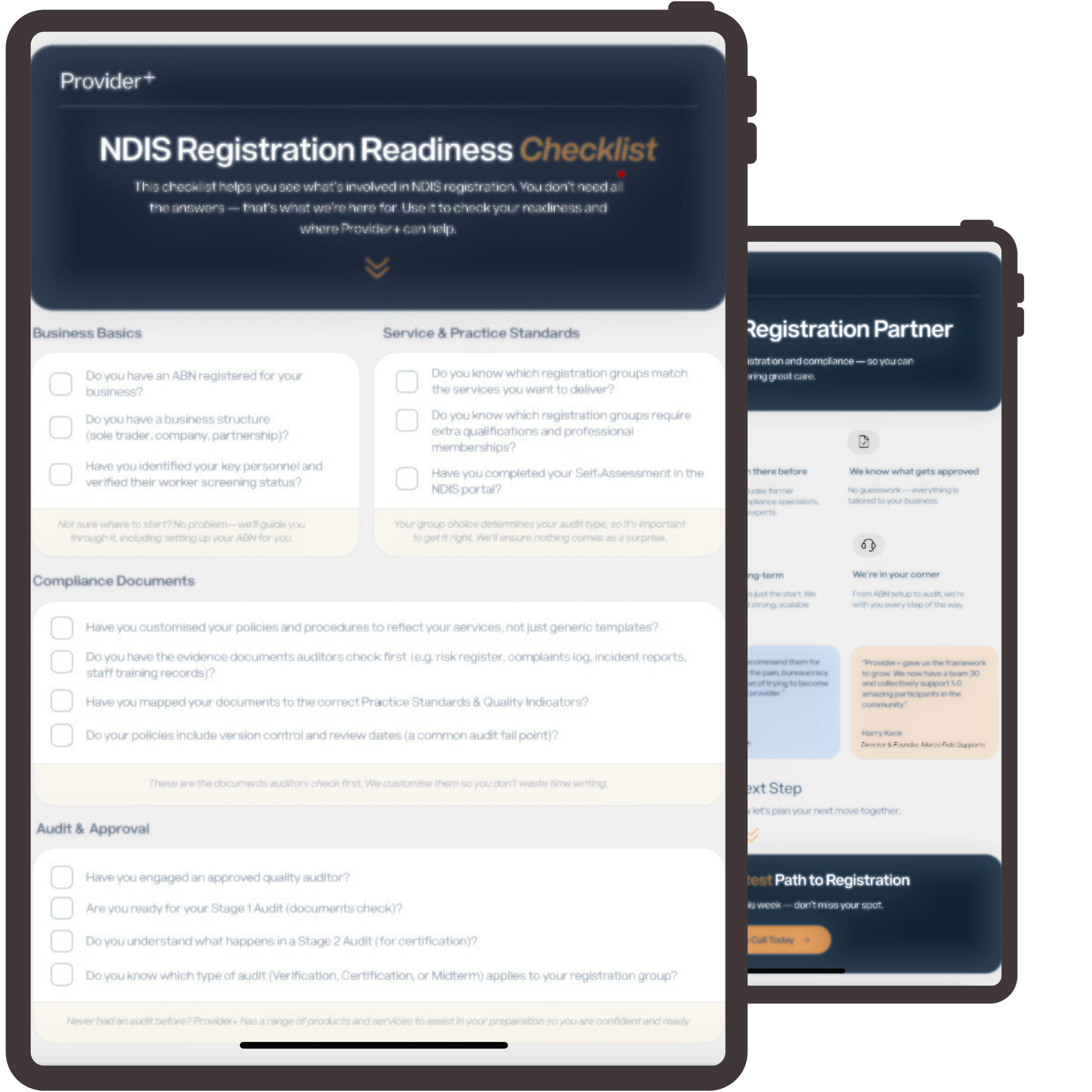Reframing the Use of an NDIS Consultant for Provider Businesses
As the NDIS landscape continues to evolve, many providers turn to consultants for guidance on compliance, registration, and how to deliver NDIS supports effectively. While consultants can offer valuable expertise, the NDIS Commission has made it clear that providers remain fully responsible for meeting their regulatory obligations. Relying on consultants does not absolve organisations from ensuring compliance with NDIS Practice Standards and the Code of Conduct. This article explores the NDIS Commission’s stance on the use of consultants, the potential risks involved, and best practices for providers to navigate compliance effectively whilst engaging with consultants.
The NDIS Commission’s Position on Consultants
The NDIS Commission does not regulate or endorse consultants, and providers must be cautious when relying on external advisors. While consultants can offer guidance and expertise, they cannot guarantee compliance, registration approval, or audit success. Ultimately, it is the responsibility of the provider —not the consultant—to meet the NDIS Practice Standards and legal obligations during the audit process.
Key Risks Highlighted by the NDIS Commission

The Commission warns that some consultants may:
- Provide incorrect or misleading advice, leading to compliance breaches.
- Overpromise guaranteed registration or audit approvals (which is not possible).
- Charge excessive fees for services that may not be necessary.
- Lack a strong understanding of NDIS regulations and evolving compliance requirements.
- Encourage shortcuts that could result in serious consequences, including deregistration.
Incorrect advice can lead to non-conformities in the audit report, affecting the provider's compliance status.
How to Choose a Reliable NDIS Consultant: A Guide for NDIS Providers

Using an NDIS consultant can help providers navigate compliance and improve their operations. However, it’s crucial to choose a consultant carefully to minimise risks and ensure value. Below is a guide to selecting a reliable NDIS consultant. Ensure the consultant understands the specific requirements for your registration group to provide accurate guidance.
Verify Compliance Knowledge
Understanding the requirements of a certification audit and the NDIS audit process is essential, especially for NDIS providers delivering higher risk or more complex services.
1. Check Qualifications & Experience
- Ensure the consultant has NDIS industry experience and a proven track record.
- Look for formal qualifications in disability services, compliance, or business management.
- Verify experience with NDIS registration, audits, and compliance processes, particularly with registered NDIS providers.
Red Flag: Consultants with no history in the NDIS but claiming to be “experts.”
2. Verify Compliance Knowledge of NDIS Practice Standards
- Confirm they have up-to-date knowledge of NDIS Practice Standards, Worker Screening, and the Code of Conduct.
- Ensure they provide advice that aligns with NDIS Commission requirements.
- Emphasise the importance of choosing approved quality auditors to ensure compliance with NDIS Practice Standards. Ensure they understand the specific requirements for different registration groups within the NDIS framework.
Red Flag: Promising “guaranteed” approval for registration or suggesting shortcuts.
3. Assess Reputation & References
- Look for testimonials, reviews, or references from other NDIS providers.
- Check for complaints, scams, or misleading practices by searching online and checking industry forums.
- Consider feedback from NDIS participants to understand their experiences and satisfaction with the NDIS services provided.
Red Flag: Limited (or lack of) reviews or references, or a history of client complaints.
4. Understand Fees & Costs
- Ask for clear pricing and a breakdown of services before signing an agreement.
- Avoid hidden fees by requesting a full quote upfront.
- Consider the financial implications of NDIS funding when choosing a consultant, as it can affect the overall cost and service quality.
Red Flag: Consultants asking for large upfront payments without clear deliverables.
5. Ensure Ethical Conduct & Transparency
- They should act in your best interest, not just push unnecessary services.
- They should disclose any potential conflicts of interest, such as partnerships with audit firms or other businesses.
- They must comply with the legal obligations under Australian Consumer Law, ensuring accountability and maintaining standards.
Red Flag: Pressure to buy unnecessary services or vague contracts.
6. Protect Data & Privacy
- If sharing sensitive business or participant data, ensure there is a confidentiality agreement.
- Check how they store and protect your business information.
Understanding the initial scope of data sharing is crucial to ensure that all necessary criteria and obligations are met.
Red Flag: Consultants asking for excessive access to confidential business data without proper agreements.
Making an Informed Choice in the Audit Process

- Compare multiple consultants before making a decision.
- Cross-check all advice against NDIS Commission guidelines.
- Ensure your business remains responsible for compliance – never fully outsource this responsibility.
By taking these steps, you can select a trusted and ethical consultant who will support your business in achieving compliance and growth. Ensuring the proper delivery of NDIS supports and services is crucial for meeting the standards set by the NDIA and the NDIS Commission.
Final Thoughts: Providers Must Own Their Compliance
The NDIS Commission’s stance on consultants is clear: while external support can be valuable, the responsibility for compliance lies with the provider. Choosing a consultant should be a careful, well-researched decision, and NDIS providers must always cross-check external advice with official Commission guidelines.
By taking a proactive approach to compliance, providers can safeguard their registration, ensure high-quality service delivery, and maintain trust with participants. The NDIS is designed to assist Australians who have a permanent and significant disability by providing substantial funding and connecting them with various support services in their communities.








